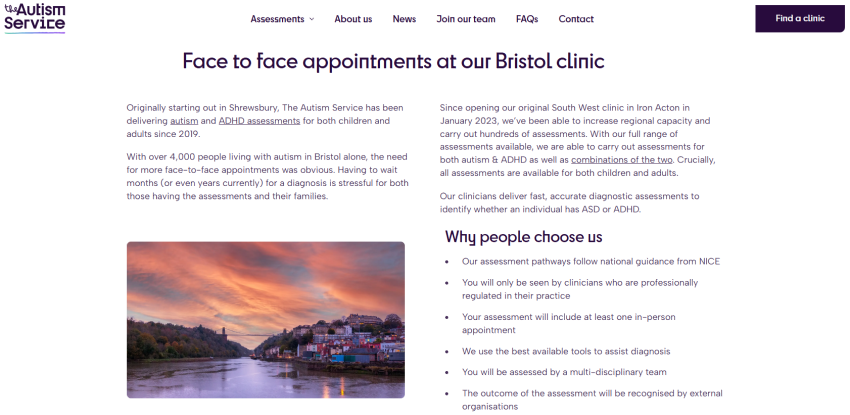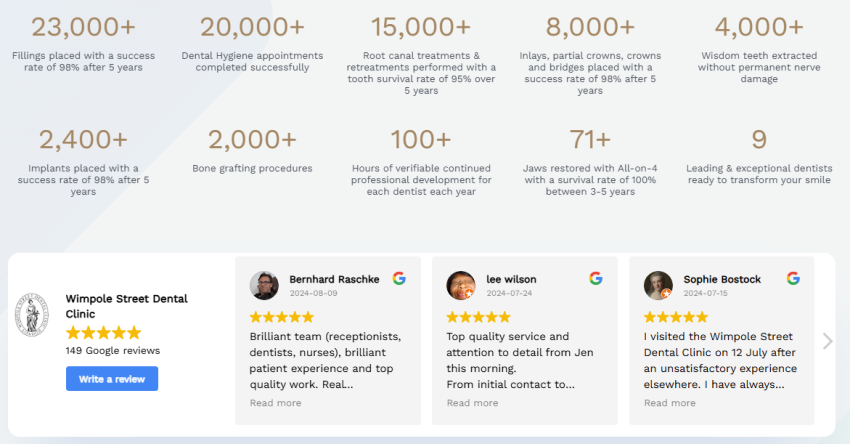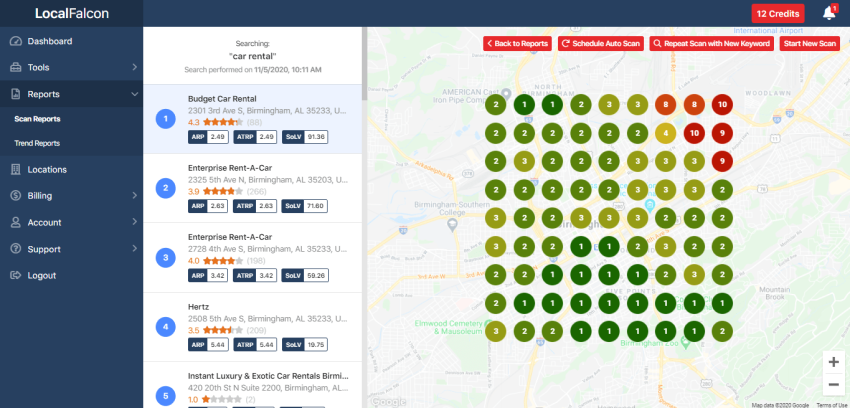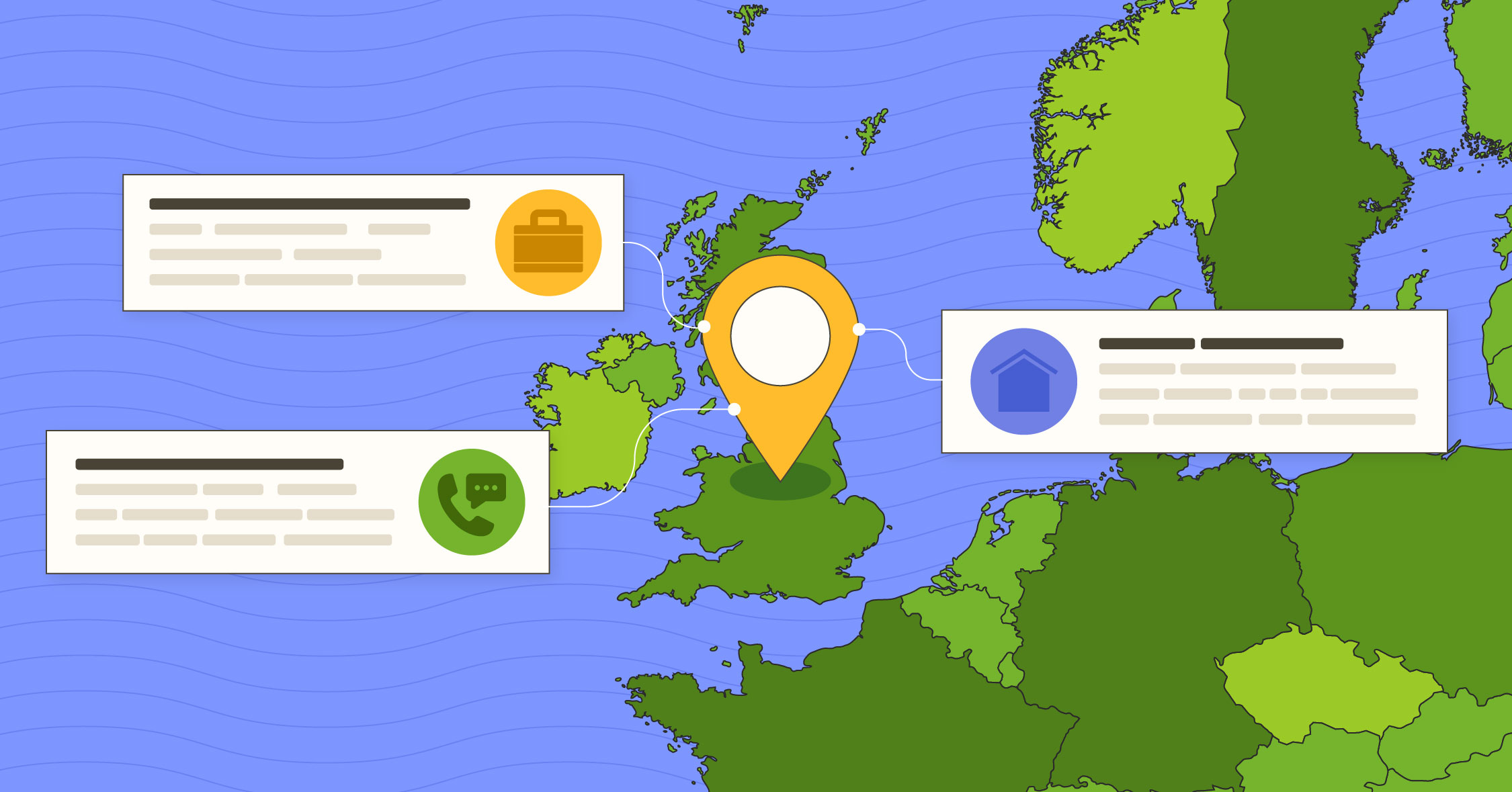In the digital landscape, effective communication is key to attracting and retaining site visitors and climbing search engine rankings.
Location pages and ‘About Us’ pages often play crucial roles in shaping user experience and enhancing SEO.
These pages are not only the key to providing essential information but also reflect your brand’s identity and values.
In this post, we’ll explore best practices for optimising a location page from both an SEO and UX copy perspective, with a part two blog focused on ‘About Us’ pages.
By implementing these strategies, anyone has the ability to improve search visibility, foster trust, and create a more engaging experience for their audience.
What Is a Location Page?

A location page is a dedicated area of a website that provides specific information about a geographic area related to a business or service.
Location pages are often used for business headquarters, store locations and events.
The information contained on a location page can vary from an address, contact information, and hours of operation, to maps and directions to help customers find the location easily.
Location pages often highlight the services within that area, along with customer testimonials and relevant images to enhance engagement.
These days, a lot of search results are heavily localised to each user based on things like their IP address, their device location and more. This means that a user in London searching for ‘appliance repair’ will see completely different search results to a user in Manchester using the same search term.
As such, location pages are crucial for local SEO and help businesses appear in search results when potential customers look for services in their area.
If your service requires an on-site visit, a well-crafted location page could be a game changer.
How To Improve Your Location Page Content
If you’re looking to improve the content on your location page, then follow these effective tips below:
- Focus on Keywords: Targeting the correct keywords on your location page improves search visibility, drives relevant traffic, and attracts local customers. This contributes to increasing your site’s online presence. Often, the keywords will be a combination of your generic target keywords and the location in question, such as ‘appliance repair London’.
- Make Sure Your Name, Address and Phone Number Are Correct: These three pieces of information are essential to any location page, and making sure that the information is correct and delivered to users in an easy-to-read manner is the key to avoiding confusion.
- Always Add Opening and Closing Times: If relevant, including opening and closing times can improve user experience by providing information for planned visits. In terms of SEO, it can impact local search rankings and relevance for potential customers.
- Make Use of Location-Specific Content: Location-specific content can enhance UX by making information relevant and relatable, which in turn fosters trust. Additionally, it helps prevent your location pages from being seen as potential doorway pages by search engines. By including relevant, location-specific information, you ensure that your pages are distinct and well-differentiated, even at scale.
- Use Google Maps to Your Benefit: Embedding Google Maps on your location page can make it much easier for users to find you, improving the overall experience.
- Location-Specific Images Are a Must: Similar to location specific content, incorporating relevant imagery also helps differentiate your location pages, and increases legitimacy in the eyes of users if it’s your own unique material. See our guide to Image SEO Guide for more tips.
- Use Internal Linking: Internally linking to other relevant locations can help increase overall authority within the local area.
- Include Focused Reviews: Reviews are a strong trust signal, especially if your product offering or service lines are seen as significant purchases. Including them on location pages enhances authority and trustworthiness, influencing potential customers’ decisions, and potentially improving your rankings for longtail keywords. It’s recommended that these reviews be from happy clients or customers from within a specific location. For example, if a client were from London, their review should definitely appear on London location pages.
- Add Valuable FAQs: It’s important to add FAQs of value, for example ‘Can I get to [location] from public transport?’ These FAQs help drive relevancy and have the potential to appear in featured snippets.
How To Optimise Location Pages for SEO?
To keep in line with best practices, site owners can optimise their pages for SEO in the following ways.
Feature Customer Reviews

As mentioned previously, the quality and legitimacy of your reviews and how you present them could be the difference between a user converting, or bouncing back to the search results. Here are some tips on building the perfect customer reviews:
- Build Trust: 86% of U.S. consumers believe transparency in business matters now more than ever. Showcasing authentic experiences, highlighting positive feedback, and responding to concerns is important. Transparency and engagement demonstrate reliability, fostering a sense of community and encouraging potential customers to engage.
- Boost Credibility: Boost credibility with customer reviews by displaying verified testimonials, showcasing diverse experiences, and addressing negative feedback constructively. Authenticity and responsiveness reinforce trust, demonstrating commitment to customer satisfaction and quality service.
- Improve Local SEO Efforts: Improve local SEO by encouraging customer reviews on platforms like Google and Yelp. Fresh, positive reviews can boost rankings, enhance visibility, and signal relevance to search engines, attracting more local traffic.
- Influence Purchase Decisions: Influence purchase decisions by showcasing authentic customer reviews that highlight benefits and experiences. Positive testimonials address concerns, and provide social proof, encouraging potential buyers to choose your product or service.
Implement LocalBusiness Structured Data
Schema markup is a structured data vocabulary that helps search engines understand website content better.
Implementing the markup in your HTML, preferably using JSON-LD, can make you eligible for rich results, in turn helping you stand out amongst the competition.
You don’t need to add LocalBusiness schema on every page of your site, but it should be implemented on relevant pages like your homepage and location pages.
Be sure to make use of Google’s Rich Results Test or the SEO Spider to double check implementation, and monitor performance in the search console.
Incorporate Relevant FAQs
Incorporating relevant FAQs on a location page can improve SEO by addressing common customer queries, enhancing user experience, and increasing engagement.
This content can lead to featured snippets in search results, boosting visibility and driving more targeted traffic to your site.
To include FAQs, identify common questions related to your location and services, and create a dedicated FAQ section on your page, using clear, concise answers. Use tools such as AlsoAsked to identify FAQs with search interest at scale.
Create a Localised URL Structure
Optimising URLs is a very small ranking factor, but by incorporating geographic identifiers and relevant keywords, you can also create a cleaner, more user-friendly structure.
Imagine a URL like www.example.com/ballet/london — it’s immediately clear to users what they can expect from this page.
This approach not could not only affect your rankings, albeit small, but also enhances the user experience by making it crystal clear how relevant your page is to a specific area.
To localise your URLs like a pro, sprinkle in those location keywords, use hyphens for easy reading, keep it concise, and maintain consistency across all your location-specific pages.
For more information, see our URL Structure Guide.
Create a Localised Page Title
A localised page title should include specific geographic keywords, enhancing relevance for local searches, for example, “Appliance Repair in London – RepairGuys.co.uk”.
Localised page titles can improve SEO by enhancing relevance for specific geographic searches, increasing click-through rates, and helping search engines understand the content context.
This ultimately drives more targeted traffic to a website.
To create a localised page title, include the location name and relevant keywords. Keep it concise, descriptive, and engaging. For more information on how to do this, check out our in depth guide on page titles.
Location Pages for Areas You Don’t Have a Presence
On the subject of creating location pages for areas where you don’t have a physical presence, such as an office or headquarters, this is absolutely fine if your business does actually service those areas.
If you are spinning up location pages for areas that you do not currently serve, this is where it could be seen as spammy or unethical, as well as a poor user experience.
As well as this, it’s important not to go too granular when it comes to creating pages within locations. This is something to be checked on a case by case basis, and would involve analysing things such as search volume, the size of the location and the overall competitiveness of the area and industry.
How To Optimise Location Pages for UX and SEO Copy
Because of the practical uses of a locations page from outlining the essential locations of provided services to customers, it’s important to consider how the copy reads through the lens of user experience copy.
Some key criteria for creating a well-written locations page include:
- Clear & Concise Headings: Clear headlines help users quickly grasp the page’s purpose, making navigation intuitive and improving comprehension, while improving rankings. For more information see our SEO headings guide.
- Descriptive Subheadings: Subheadings break up text and guide users through the content, enhancing readability and allowing for easier scanning of information.
- Local Language & Terms: Using familiar terms and phrases relevant to the local audience creates a connection, making the content more relatable and engaging.
- Action-Oriented Language: Encouraging users to take action with strong verbs (for example, ’Visit,’ ‘Contact’) in the copy motivates engagement and increases conversion rates.
- Engaging & Relevant Content: Providing valuable information about local services, events, and community ties keeps users interested and encourages them to explore further.
- FAQs With Clear Answers: Anticipating user questions and providing direct answers enhances user satisfaction, reducing confusion and increasing trust in the business.
- Consistent Tone of Voice: A consistent tone fosters familiarity and reinforces brand identity, making users feel more comfortable and connected with the business.
- Use Bulleted Lists: Bullet points make information digestible and easier to scan, helping users find key details quickly without overwhelming them with text.
- Highlight Unique Selling Points (USPs): Showcase what sets your location apart (special services, promotions) to help persuade users to choose your business over competitors.
- Create a Dedicated ‘Team’ Section: A team section helps shine a spotlight on team members who are responsible for work in that area. This adds both authority and an air of expertise to a locations page.
- Call-to-Action (CTA) Clarity: Clear, compelling CTAs guide users on the next steps, improving conversion rates by making engaging with your business easy.
Implement CRO Tactics Based on Optimisation Needs
CRO tactics are a set of strategies used by SEO professionals to increase conversion rates, improve user experience, maximise ROI, and effectively turn visitors into customers.
These tactics include A/B testing, user feedback, optimised CTAs, streamlined navigation, personalised content, mobile optimisation, and trust signals to enhance conversions.
Additional ways CRO tactics can be used include:
- Regularly Update Content: Regularly updating content is crucial for SEOs as it increases accuracy, enhances user experience, and reflects current offerings. Fresh content improves search rankings, engages visitors, and builds trust, ultimately driving more traffic and conversions as business needs evolve.
- Monitor Page Engagement Metrics in GA4: Monitoring page engagement metrics in GA4 is useful for SEO as it reveals user behaviour, identifies high-performing content, and highlights areas for improvement. Key metrics include bounce rate, average session duration, and pages per session, as they indicate content relevance and user interest. Tracking user behaviour helps identify user engagement patterns, revealing which content attracts attention.
Track Local Keyword Rankings

Tracking local keyword rankings for a location page is crucial for SEO as it helps assess visibility in local searches.
It identifies which keywords drive traffic, allowing optimisation efforts to focus on high-performing terms.
Use tools like Google Search Console, SEMrush, or Ahrefs to track local keyword rankings for your location page. It’s important to use location-based rank tracking as it helps site owners monitor any searches from specific locations.
Monitor specific local keywords, analyse performance over time, and adjust your SEO strategy based on insights gathered to improve visibility and drive more targeted traffic.
To Summarise
In summary, a well-crafted location page is essential for any business looking to enhance its online presence and attract local customers.
By providing clear, relevant information about your geographic area, you not only improve your visibility in search results but also create a seamless user experience.
Implementing best practices—such as optimising for local keywords, providing accurate NAP details, incorporating customer reviews, and using schema markup — can significantly boost your local SEO efforts.
Also, focusing on user experience through engaging content and clear calls to action will help convert visitors into loyal customers.
Don’t overlook the power of location pages, they are a vital part of your marketing strategy that can make a lasting impact on your business’s success.
We hope you’ve taken away valuable information that can be used to enhance the SEO and UX potential of your locations page.
For all your copywriting needs, see our dedicated copywriting services page, where we offer you high-quality, tailor-made copy with boundless SEO potential.
Keep your eyes peeled for part two in this blog series, “How to Write an ‘About Us’ Page”.

Leave a Reply